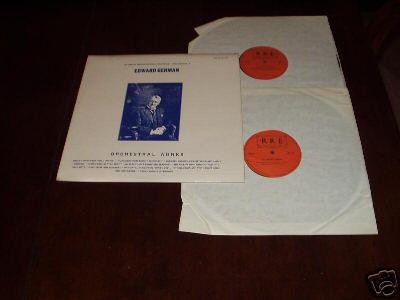Edward German conducts his orchestral music
In 1978, Rare Recorded Editions put out a compilation of Edward German's self-conducted recordings. These recordings were made between 1915 and 1925, all from his repertoire outside the opera.
The following selections are included:
THREE DANCES FROM NELL GWYN
VALSE GRACIEUSE FROM LEEDS SUITE
BOURREE AND GIGUE FROM MUCH ADO ABOUT NOTHING
SUITE FROM AS YOU LIKE IT
HARVEST DANCE FROM THE SEASONS
THE WILLOW SONG FROM OTHELLO
GIPSY SUITE
SUITE FROM THE TEMPTER
INCIDENTAL MUSIC FROM HENRY VIIi
INTRODUCTION AND TWO DANCES FROM THE CONQUEROR
THEME AND SIX DIVERSIONS
The 1978 LP reissues of Edward German's 1918 recording of "Merrie England" and his acoustic orchestral recordings were reviewed in the pages of THE GRAMOPHONE, February 1978, (Vol. 55); pg. 1477 (authorship: A.M.L.) ---
GERMAN, TOM JONES: Morris Dance; Gavotte (Ho2991af. D188. November 30th, 1917); Introduction and Jig
(Ho3826ae. E28. November 30th, 1917). Symphony Orchestra conducted by Sir Edward German. Have you news of my
boy Jack? Louise Kirkby Lunn (contralto), Symphony Orchestra conducted by Sir Edward German (Ho2748af. 03572.
July 1917). TOM JONES - selection (HMV C952. 1919); THE EMERALD ISLE (Sullivan completed German) - selection
(AL8312/3af. C415. 1915). Coldstream Guards Band conducted by Lt-Col. J. MacKenzie-Rogan. Rare Recorded
Edition (Mono) RRE162-9 (two records, nas, £6.00).
GERMAN. Orchestral works. *Symphony Orchestra, +Royal Albert Hall Orchestra, both conducted by Sir Edward
German. Rare Recorded Edition (Mono) RRE170-1 (two records, nas, £7.00).
RRE170: NELL GWYNN - Country Dance (Ho2041af. D187. July 26th, 1916); Pastoral Dance (Ho2352af. D187.
December 1st , l916); Merrymakers' Dance (Ho2042af. D188. July 26th, 1916). Leeds Suite* - Valse gracieuse
(Ho4279af. D579. February 1920). MUCH ADO ABOUT NOTHING* - Bourée (Hol997af. D185. July 14th 1916);
Gigue (Ho2350af. December lst, 1916). AS YOU LIKE IT - Woodland Dance; Children's Dance (both Ho2043af.
D184. July 26th, 1916); Rustic Dance (Ho2O45af. D184. July 26th, 1916). The Seasons - Harvest Dance (Ho3835af.
D579. June/July 1919). OTHELLO+ - The Willow Song (Cc2866/7. D772. September 5th, 1923). Gypsy Suite
(Ho2742af, Ho2754af, Ho2988af, Ho2989af. D189, D473, July and December 1917).
RRE171: THE TEMPTER* - Overture (Ho4336/7af. D492. March 1920); Berceuse (Ho4338af. D516. March
1920); Bacchalian Dance (Ho4339af. D516. March 1920). HENRY VIII - Overture* (Ho4182/3af. D527. December
1919); Prelude to Act 3+ (Cc3393. D870. September 5th, 1923); Morris Dance*; Shepherds' Dance*. Torch Dance*
(Ho2354/5af. D186. December 1st, 1916). THE CONQUEROR+ - Entrance and Dance of the Children; Satyr Dance
(Cc3394. D870. September 5th, 1923). Theme and Six Diversions (Ho4165af, Ho4166af, Ho4169af, Ho4178af.
D546, D550. December 1919).
There have ...always been those who have remained faithful to the tradition of well fashioned light music that Edward German so admirably personified. It is due to the efforts of the Vintage Light Music Society that we now have this collection of Edward Gerrnan's ....acoustical recordings of his own music.
What is immediately striking about the recording details listed above (much of which will not be found on the record sleeves) is
the way in which they parallel the progress of Elgar's early recording career. Perhaps one should not go on to labour the fact
that, whereas Elgar went on to remake most of his recordings in the electrical era, German was presumably not asked to do so.
Five years Elgar's junior, German was still conducting in the late 1920s; but his only electrical recordings were a couple of
records on the Metropole label. A request to remake Merrie England for Columbia in the 1930s came too late (he had
conducted the work for the BBC in 1928); but apparently the neglect of his music had by then caught hold.
Many of the items here come from those sets of dances that German provided for so many London theatre productions of the
1890s and which provide much of the popular image of German as a composer. Clearly they were ideal in length and style for
the early gramophone. It is a welcome change to hear others besides the famous Nell Gwyn and Henry VIII dances, and
charming they prove themselves to be. Yet, ideal though they may be for isolated 78 rpm record sides, they do begin to pall
when strung together as on the first side of the orchestral set. With "The Willow Song" from Othello (a short tone poem for the
Royal Academy of Music's centenary in 1922 and German's last orchestral work) things become more varied, and it is a
pleasure to be given the whole of the delightful Gipsy Suite. Best of all, though, is the music for The Tempter, a Henry Arthur
Jones drama of 1893. Here there are glimpses of the dramatic strength of the Second Symphony of the same year. This is
music that is well worth getting to know, and one can well imagine that in a country that valued its musical heritage more highly
than ours the music from The Tempter would be found quite often in concert programmes.
Cast one's mind beyond sixty years of crackle and the limitations of the acoustic recording process, and one can hear too what
exceptionally fine performances these are - performances that bring out the charm, fluency and flexibility of the music. German
was obviously justly famed as a conductor of his own music...
As a whole these transfers to LP have been well done - certainly among the better acoustic transfers to come my way. There
are also some useful notes on the music and recordings. What a pity, though, that the author should have followed most musical
reference works in getting German's real name wrong. He was not born Edward German Jones, but German Edward Jones.
Issue History
[original recordings 1915- 1925] His Master's Voice - The Gramaphone Company Ltd.
Rare Recorded Editions 1970 33 1/3 LP
